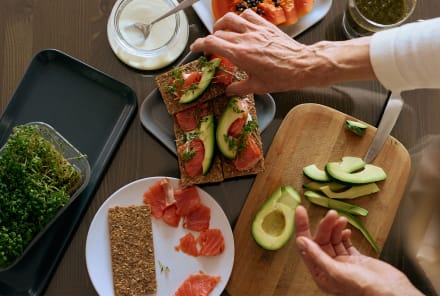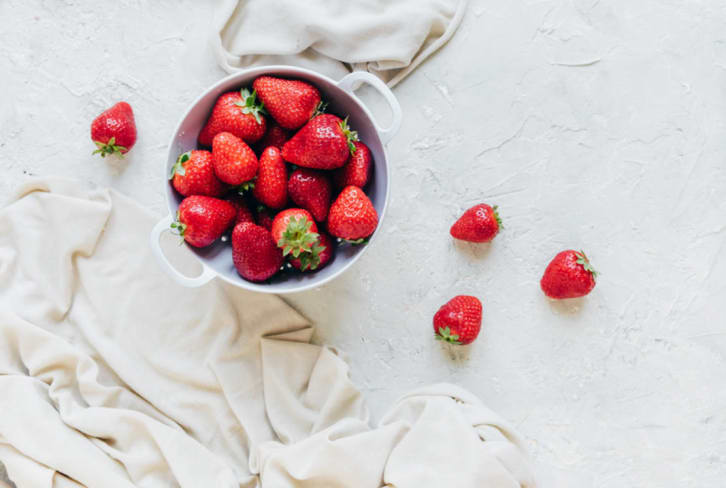Advertisement
How To Eat For A More Resilient Brain, According To New Research


We often talk about resilience on a grand scale—how you recover from major traumatic experiences or how the body bounces back against adversity. But what about everyday resilience? How do we foster a stronger tendency to bounce back from daily stress?
According to a new study, food plays a larger role in resilience than you might expect. Below, what the researchers discovered about diet quality and stress resilience and why it matters for your well-being.
Yes, the food you eat can make you more resilient
Published in the journal Nutrients, the new research suggests that diet quality was "positively and significantly1" associated with overall resilience for every age group, especially younger adults.
Researchers used a detailed food frequency questionnaire to gauge diet quality, assigning positive scores to foods like vegetables, fruits, whole grains, beans, and nuts. On the flip side, sugary beverages, processed meats, and fast food received negative scores.
Taking a closer look at how these categories were scored can help clarify diet quality and provide actionable steps to improve your own. Here's the breakdown of the 12 categories:
- Vegetables
- Fruits
- Fish
- Whole grains
- Nuts and seeds
- Beans or lentils
- Preparing meals at home
- Sugar-sweetened beverages (including 100% fruit juice) (reverse-scored)
- Red or processed meats (reverse-scored)
- High-sodium processed foods (reverse-scored)
- Sugar-sweetened baked goods or candy (reverse-scored)
- Fast food (reverse-scored)
Like many metrics, this scale is not perfect or personalized. It's important to remember that this assessment measures overall consumption, meaning if you eat candy or processed meats in moderation, it won't take your diet quality score.
But as a general recommendation, the more nutrient-rich foods you consume, the more you will support stress resilience. You can't control every stress-inducing task or event, but you can support your emotional well-being through food.
The takeaway
New research suggests diet quality and stress resilience are strongly associated, especially for younger adults. The key to raising your diet quality is to reach for nutrient-dense foods more often than you do their counterparts. Plus, there are even specific foods you can eat during bouts of stress to support a calmer mind—here are the best ones to consider.
Watch Next
Enjoy some of our favorite clips from classes
Enjoy some of our favorite clips from classes
What Is Meditation?
Mindfulness/Spirituality | Light Watkins
Box Breathing
Mindfulness/Spirituality | Gwen Dittmar
What Breathwork Can Address
Mindfulness/Spirituality | Gwen Dittmar
The 8 Limbs of Yoga - What is Asana?
Yoga | Caley Alyssa
Two Standing Postures to Open Up Tight Hips
Yoga | Caley Alyssa
How Plants Can Optimize Athletic Performance
Nutrition | Rich Roll
What to Eat Before a Workout
Nutrition | Rich Roll
How Ayurveda Helps Us Navigate Modern Life
Nutrition | Sahara Rose
Messages About Love & Relationships
Love & Relationships | Esther Perel
Love Languages
Love & Relationships | Esther Perel
What Is Meditation?
Box Breathing
What Breathwork Can Address
The 8 Limbs of Yoga - What is Asana?
Two Standing Postures to Open Up Tight Hips
How Plants Can Optimize Athletic Performance
What to Eat Before a Workout
How Ayurveda Helps Us Navigate Modern Life
Messages About Love & Relationships
Love Languages
Advertisement

How To Gain 2.5 Pounds Of Muscle With Your Current Workout Routine
Molly Knudsen, M.S., RDN

This One Type Of Food Can Cause Overeating & Derail Weight Loss Goals
Gretchen Lidicker, M.S.

How To Gain 2.5 Pounds Of Muscle With Your Current Workout Routine
Molly Knudsen, M.S., RDN

This One Type Of Food Can Cause Overeating & Derail Weight Loss Goals
Gretchen Lidicker, M.S.














